

The 61 countries that could easily be unplugged from the internet. It's becoming the trademark move of failing regimes: silence your critics and cripple their communications by cutting off the internet.
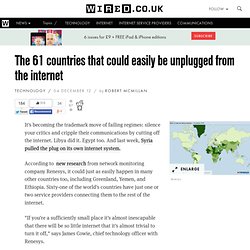
Libya did it. Egypt too. And last week, Syria pulled the plug on its own internet system. According to new research from network monitoring company Renesys, it could just as easily happen in many other countries too, including Greenland, Yemen, and Ethiopia. Sixty-one of the world's countries have just one or two service providers connecting them to the rest of the internet. "If you're a sufficiently small place it's almost inescapable that there will be so little internet that it's almost trivial to turn it off," says James Cowie, chief technology officer with Renesys.
On the other extreme, more than 30 countries -- including the UK, Canada and the US -- have over 40 network providers each at their electronic frontiers. So what makes for an easily un-switched country? The Coalition Has No Digital Rights Policy. The Pirate Party movement believes that the way information is shared and controlled is a key fight in 21st century politics.
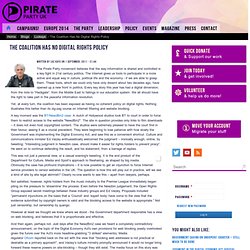
Democracies learn from Mubarak's example. For the past eight months, the world has watched, captivated, as from one country to the next, youth have manipulated the digital tools that have become part and parcel of their everyday lives to serve their activism.
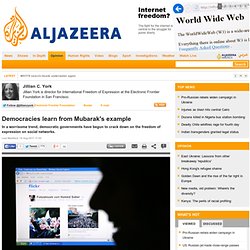
The world too has witnessed as, in each country, state actors have made various attempts to quash the use of such tools. British PM proposes social media ban for rioters. Suspected rioter David O'Neill leaves court Thursday in London after posting bail on charges, including aggravated violence.
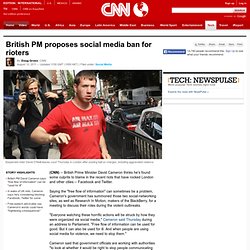
British PM David Cameron says "free flow of information" can be "used for ill"In wake of UK riots, Cameron says he's considering blocking Facebook, Twitter for someFree-speech advocates say Cameron's words could have "frightening consequences" (CNN) -- British Prime Minister David Cameron thinks he's found some culprits to blame in the recent riots that have rocked London and other cities -- Facebook and Twitter. British Prime Minister Does a 180 on Internet Censorship. After several days of destructive riots throughout the UK, British Prime Minister David Cameron is practically tripping over himself in his eagerness to sacrifice liberty for security.
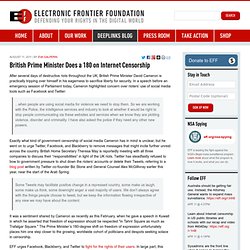
In a speech before an emergency session of Parliament today, Cameron highlighted concern over rioters’ use of social media tools such as Facebook and Twitter: ...when people are using social media for violence we need to stop them. So we are working with the Police, the intelligence services and industry to look at whether it would be right to stop people communicating via these websites and services when we know they are plotting violence, disorder and criminality. I have also asked the police if they need any other new powers. Exactly what kind of government censorship of social media Cameron has in mind is unclear, but he went on to urge Twitter, Facebook, and Blackberry to remove messages that might incite further unrest across the country.
UK to Twitter, Facebook & RIM: We Won't Ban Social Media. In a meeting Thursday with representatives from Facebook, Twitter and BlackBerry-maker RIM, British officials made it clear that they will not restrict social media use during times of chaos.
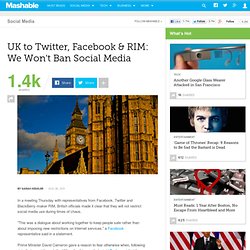
"This was a dialogue about working together to keep people safe rather than about imposing new restrictions on Internet services," a Facebook representative said in a statement. Prime Minister David Cameron gave a reason to fear otherwise when, following riots that swept through the UK earlier this month, he told Parliament that the government was examining whether to ban suspected troublemakers from social media. Blackberry would close UK service in unrest if ordered. Twitter study casts doubts on ministers' post-riots plan.
Analysis of more than 2.5m Twitter messages relating to the riots in England has cast doubt on the rationale behind government proposals to ban people from social networks or shut down their websites in times of civil unrest.
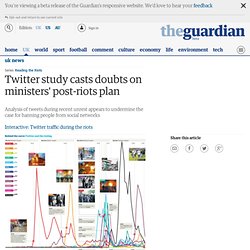
A preliminary study of a database of riot-related tweets, compiled by the Guardian, appears to show Twitter was mainly used to react to riots and looting. Timing trends drawn from the data question the assumption that Twitter played a widespread role in inciting the violence in advance, an accusation also levelled at the rival social networks Facebook and BlackBerry Messenger. The unique database contains tweets about the riots sent throughout the disorder, which began in Tottenham, north London, on 6 August. BART Defends Decision To Cut Off Cell Service After Civil Rights, FCC Concerns Raised. After rumors of a possible protest intended to disrupt service reached BART officials yesterday, they pursued a number of strategies to ensure that didn’t happen.
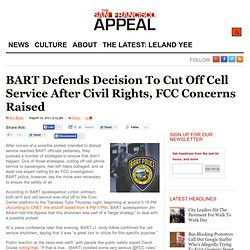
One of those strategies, cutting off cell phone service to passengers, has left riders outraged, and at least one expert calling for an FCC investigation. BART police, however, say the move was necessary to ensure the safety of all. US railway blocks phones to quash protest - Americas. A rail transit provider in the United States disabled mobile phone services to prevent a planned protest on Thursday, attracting criticism and unflattering comparisons to crackdowns on dissent in the Middle East.
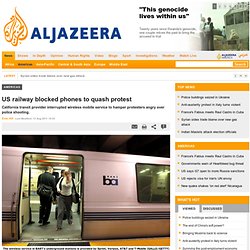
Demonstrators in northern California's Bay Area had planned a protest to condemn the shooting death of Charles Hill, who was killed on July 3 after Bay Area Rapid Transit (BART) police officers responded to complaints about a drunk man at a station in the city of San Francisco. Hill was fatally shot in the torso - police said he had lunged with a knife - and protesters responded eight days later with a demonstration that shut down three San Francisco BART stations. BART San Francisco cut cell services to avert protest - BlogPost. Posted at 05:12 PM ET, 08/12/2011 Aug 12, 2011 09:12 PM EDT TheWashingtonPost.
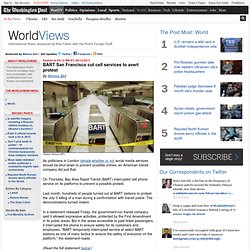
S.F. subway muzzles cell service during protest. The operators of the Bay Area Rapid Transit subway system temporarily shut down cell service last night in four downtown San Francisco stations to interfere with a protest over a shooting by a BART police officer, a spokesman for the system said today. "BART staff or contractors shut down power to the nodes and alerted the cell carriers," James Allison, deputy chief communications officer for BART, told CNET. Statement on temporary wireless service interruption in select BART stations on Aug. 11. Organizers planning to disrupt BART service on August 11, 2011 stated they would use mobile devices to coordinate their disruptive activities and communicate about the location and number of BART Police.
EFF: BART-initiated cell servic... Telecoms and human rights. Press StatementAugust 23, 2011 An article from Bloomberg published on 23 August 2011 has linked technology, supplied by a business that was part of Nokia Siemens Networks between April 2007 and March 2009, with human rights abuses in Bahrain. The article alleges that a monitoring center was supplied by a Siemens business that subsequently became part of Nokia Siemens Networks when it was formed in 2007.
Nokia Siemens Networks subsequently divested this monitoring center business in March 2009 and no longer provides this technology to any country. The Free Speech Blog: Official blog of Index on Censorship » More guidance needed for judges sentencing Facebook “thought criminals” Plenty are worried by the inconsistent sentences across England being handed down by a justice system tasked to crack down on participants in last week’s mass riots — years in jail for some, community service orders for others. It raises fundamental questions about the independence of the judicary and its response to crimes one judge called “completely outside the usual context of criminality”. For most of the English court system, that seems particularly true of Facebook, Twitter and Blackberry “thought crimes”. Thousands of connected citizens poured views, fears and news into social media during the night of August 9.